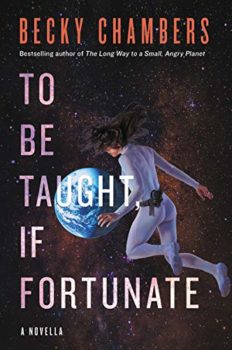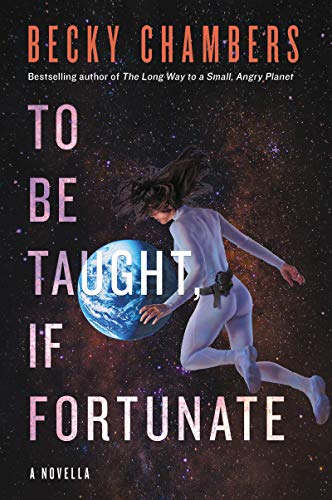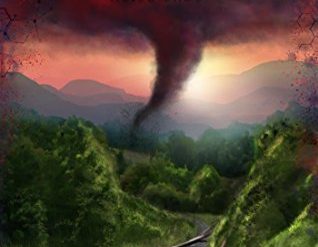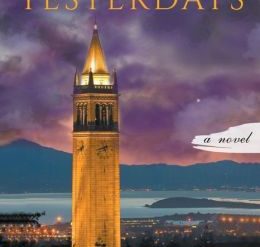
In 2015, Becky Chambers published the first volume in her award-winning Wayfarers series. She has completed three books to date. Meanwhile, Chambers found time to write an excellent hard science fiction novella of quite a different sort. (Others might call a book of this length a novel.) While To Be Taught, If Fortunate features well-developed characters, as does the series, it’s a far deeper excursion into hard science fiction than the Wayfarers books. And, despite the fact that Chambers herself is not a scientist, she displays an impressive command of the underlying science.
To Be Taught, If Fortunate by Becky Chambers (2019) 176 pages ★★★★☆
Twenty-eight light-years from Earth
To Be Taught, If Fortunate opens in the mid-twenty-second century nearly twenty-eight light-years from Earth. The starship Merian left home almost fifty years ago, en route to “the four habitable worlds in orbit around the red dwarf star Zhenyi (BA-921)”: the icy moon Aecor, and the terrestrial planets Mirabilis, Opera, and Votum. In the course of this excellent hard science fiction novella’s fewer than 200 pages, the four members of the Merian’s international crew will visit all four worlds. And therein lies the tale.
“Extraterrestrial life was common knowledge”
This is not a first contact story. “[B]y the start of my life [in the late twenty-first century], extraterrestrial life was common knowledge, something every kid took for granted.” The working assumption is that, wherever the conditions for life exist, life will evolve. And the profusion of life-forms the crew of the Merian encounters is the centerpiece of this tale. If you imagine humanoid aliens walking on two feet and displaying eyes, noses, and mouths, guess again. And if you’re wondering what instead you might find in this story, take a look at what scientists have turned up in fossils from the Cambrian Explosion.
The narrator of the story is Flight Engineer Ariadne O’Neill. She “was born in Cascadia on July 13, 2081″ and is now, in Earth terms, still barely older than thirty. She had aged just two years while in suspended animation (“torpor”) for most of the journey. In fact, all four members of the Merian‘s crew were young by Earth’s standards because the mission would age them by two years in either direction and occupy a full sixteen years, with four years on each of the four habitable worlds of the Zhenyi system. Thus, even with relativistic time dilation, the twenty-something members of the crew will be nearly fifty by the time they return to Earth.
Where that title comes from
The arresting title of this novella is cribbed from the statement recorded in 1977 by then-UN Secretary General Kurt Waldheim for the Voyager Golden Record. His words read, in part, “We step out of our solar system seeking only peace and friendship—to teach, if we are called upon; to be taught, if we are fortunate.”
An excellent hard science fiction novella
In her Acknowledgments, Chambers credits “the counsel of astrobiology educator Nicoline Chambers, my long-time science adviser (and, y’know, my mom), who never seems to tire of my sloppy late-night emails about whether I should use this term or that, whether my planets make sense, and so on.” It shows.
For further reading
I’ve also reviewed the first book in the Monk and Robot series, A Psalm for the Well-Built (The intriguing start to a new Becky Chambers series) as well as the three outstanding books by Becky Chambers published to date in the Warfarers series, which won the Hugo Award for Best Series in 2019:
- The Long Way to a Small, Angry Planet (Wayfarers #1): A delightful modern space opera that’s all about character development;
- A Closed and Common Orbit (Wayfarers #2): Lovable characters in this off-beat space opera; and
- Record of a Spaceborn Few (Wayfarers #3): A brilliant invented universe in an unusually good new science fiction novel.
And I’ve included Becky Chambers on my list of Seven new science fiction authors worth reading now.
For more good reading, check out:
- The five best First Contact novels
- The ultimate guide to the all-time best science fiction novels;
- Great sci-fi novels reviewed: my top 10 (plus dozens of runners-up); and
- The top 10 dystopian novels reviewed here (plus dozens of others).
You might also check out Top 10 great popular novels reviewed on this site.
And you can always find my most popular reviews, and the most recent ones, plus a guide to this whole site, on the Home Page.


























